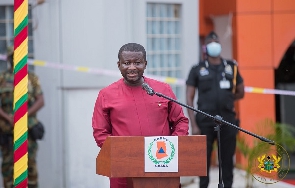The Director-General of the National Disaster Management Organisation (NADMO), Eric Nana Agyemang-Prempeh, has called on the public to desist from politicising moves to demolish unauthorised structures along waterways. According to him, the country was sitting on a time bomb with the continuous encroachment and illegal activities around ecological sites and the worst could happen if ‘harsh’ decisions were not taken. Speaking to journalists at an event to commemorate this year’s International Day for Disaster Risk Reduction in Accra yesterday, Mr. Agyeman-Prempeh said a case in point was the recent flooding of communities in the Weija-Gbawe and Ga South constituencies due to the Weija Dam spillage. “Had it not been for the level of encroachment around the dam and its passageway we wouldn’t have seen this extent of damage. A lot of the buildings there do not have permits yet you go in to demolish and it turns into NPP, NDC. “Ghana will move forward, we will reduce the flooding if we stop politicising everything and allow the District Assemblies to do their work and go all out to demolish all unauthorised structures in our waterways causing floods.” Touching on the local theme for the commemoration; “Earthquake disaster risk reduction through effective early warning,” the Director-General although Ghana was far away from major earthquake zones in the world, it was prone to earthquake and earth tremor disasters. He recalled incidences as far back as 1981 and the recent earth tremor in 2019 prompting the establishment of a technical committee to propose interventions that would improve Ghana’s earthquake preparedness and response. Following the adoption of the committee’s report, Mr. Agyeman-Prempeh said, eight earthquakes early warning equipment has been installed at vantage locations within the capital including the Weija-Gbawe Municipal Assembly, NADMO Headquarters, Parliament, and the Jubilee House. “The government considers earthquake to be a most serious occurrence that can set us back on our development journey and more importantly militate against safety of our citizens and we are committed to taking all needed measures to avert future disasters,” he said. The Chief Director of the Ministry for the Interior, Mrs. Adelaide Anno-Kumi, delivering a speech on behalf of the sector minister, underscored the importance of early warning systems to reduce disasters significantly. While expressing sympathy to recently affected persons by the Weija Dam spillage, Mrs. Anno-Kumi stressed the need for the populace to be well-informed on evacuation and disaster management methods to reduce the extent of destruction. The Country Director of the United Nations Educational Scientific and Cultural Organisation (UNESCO), Mr. Abdourahamane Diallo, gave highlights of a newly produced documentary and educational materials to sensitise the public, particularly students, on disasters. “There is still a lot more that we need to do collectively to ensure that Ghana gets the holistic capacity development that it needs to prepare adequately for an earthquake disaster or any other disaster.” He thus invited all key stakeholders to explore additional ideas that “can be brought on board to design effective interventions towards disaster risk reduction.”
Regional News of Friday, 14 October 2022
Source: ghanaiantimes.com.gh

















